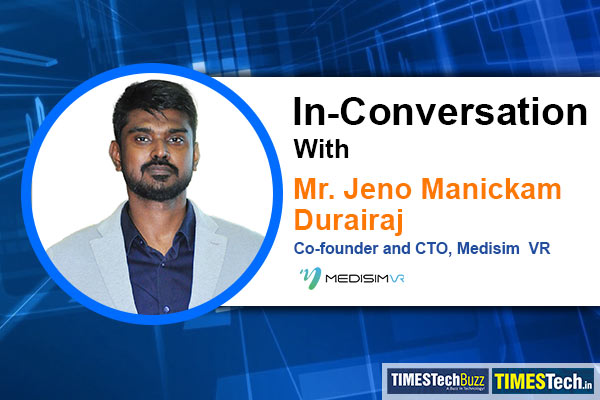Jeno Manickam Durairaj, Co-founder and CTO of MediSim VR, shares insights into the journey from game development to healthcare innovation. Discover how their blend of gaming and medical simulations is reshaping the landscape of medical training.
Read the full interview here:
TimesTech: Can you share your journey from game development to founding MediSim VR, and how it influenced your transition into healthcare?
Mr. Jeno: My initial venture into game development began during my undergraduate studies, where I was drawn to the creative and technical challenges of creating immersive experiences. This passion for game development led me to explore further into the world of simulations during my master’s degree, with a particular focus on heavy vehicle simulation. My work in this area garnered significant attention, achieving 75 million downloads on the Play Store, an indication to the impact and reach of well-crafted simulations.
The early application of VR technology in gaming opened my eyes to its potential beyond entertainment. The immersive nature of VR, combined with my background in simulation, naturally led me to experiment with simulation within the VR space. This experimentation evolved into developing VR training simulations for various industries, harnessing the power of VR to create realistic, engaging training environments that could transcend traditional learning methods.
It was during this phase that Sabarish (MediSim VR’s CEO) introduced me to Dr. Adith (MediSim VR’s COO), whose vision to revolutionize healthcare training resonated with me. Recognizing the transformative potential of applying VR-based simulation to healthcare training, we saw an opportunity to significantly impact how medical professionals learn and practice their skills. This shared vision was the catalyst for the formation of MediSim VR, marking our committed transition from gaming and industrial simulations to focusing on healthcare. Our journey from game development to the founding of MediSim VR underscores a broader theme of leveraging technology to enhance learning and performance across fields, ultimately leading us to the meaningful application of our expertise in the healthcare sector.
TimesTech: How does MediSim VR blend gaming and medical simulations, and what unique challenges or opportunities does this present?
Mr. Jeno: MediSim VR merges gaming and medical simulations by incorporating elements like real-time feedback, interactive environments, and gamified learning modules into medical training. This integration presents unique challenges, such as ensuring the accuracy and realism of medical procedures while maintaining an engaging and immersive experience. One significant opportunity is the ability to simulate high-risk procedures without real-world consequences, allowing future healthcare professionals to practice and refine their skills in a safe environment.
Our early exposure to artificial intelligence (AI) through gaming, coupled with game design principles, has been instrumental in developing user-friendly VR content. These gaming principles are seamlessly integrated into designing intuitive and engaging medical simulations. Furthermore, with an AI-powered analytics engine – the gaming aspect introduces elements like scoring and progress tracking, which can motivate learners and provide a measurable way to assess improvement over time.
TimesTech: What are the key features of MediSim VR’s learning modules, and how do they benefit medical practitioners?
Mr. Jeno: The key features of MediSim VR’s learning modules include realistic simulation environments, interactive procedural practice, immediate feedback, and data-driven insights on performance. These modules benefit medical practitioners by offering hands-on experience with a wide range of medical scenarios, from common procedures to rare, complex cases that might not be available in their everyday practice. This approach not only enhances their skills and confidence but also improves preparedness for real-life situations, ultimately contributing to better patient outcomes.
TimesTech: How do you adapt VR solutions to meet the specific needs of the healthcare sector, particularly in training and education for medical professionals?
Mr. Jeno: Adapting VR solutions to meet the specific needs of the healthcare sector involves close collaboration with medical professionals to ensure high fidelity and relevance. We focus on creating simulations that reflect the true complexity of medical procedures and patient interactions, while also following CBME guidelines and ensuring the evaluation is done in alignment with the OSCE checklist. This includes incorporating feedback from healthcare professionals into our development process and continuously updating our modules based on the latest medical practices and guidelines. Additionally, we prioritize user accessibility, ensuring our solutions are scalable and can be integrated into existing medical education and training frameworks.
TimesTech: Can you discuss your involvement in public sector projects as a VR consultant, and how VR technology has impacted healthcare services?
Mr. Jeno: Let me tackle it as two different questions. We did a few different projects for the public sector across defense, tourism, and information technology. We created immersive experiences for the tourism space, where in we encapsulated the history of the state over the years, the contributions of the personnel involved, and so on. The project still stands its ground and has been appreciated for being educational and entertaining. My engagement with the Singapore government involved developing a VR learning module for their Oil and Gas department, simulating emergency situations for training purposes. This module has been effectively used for five years. Additionally, I consult for the Tamil Nadu government’s experience center and advise the IT Department on identifying VR applications in their operations.
VR has changed the way patient experience is designed. From educating patients to training healthcare professionals, VR makes an array of processes in the healthcare industry to get more standardized, immersive, and effective. When the world is facing a shortage of healthcare professionals, game-changing tech that enhances the way future professionals are trained is implemented, and the impact is exponential.
TimesTech: What do you foresee as future trends in VR technology for healthcare, and how does MediSim VR plan to stay innovative in this field?
Mr. Jeno: The development in Haptics will ensure increased adaptability of VR technology. The time for creation in this space, specially making personalized learning experiences is also here. Integration with AI for enhanced simulation dynamics, and wider adoption of remote training capabilities will build accessibility.
MediSim VR plans to stay at the forefront of innovation by investing in research and development, partnering with leading medical institutions for collaborative projects, and continuously exploring new applications of VR technology in healthcare. Our aim is to not just keep pace with the trends but to set them, ensuring that MediSim VR remains a leader and a catalyst in transforming medical education and training.















